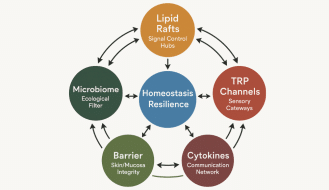Optimizing Your Health: Vitamins You Should Be Taking
If you’re like many Americans, you’re probably aware your diet may not be covering your daily nutrient needs. In the US, roughly 95% get insufficient amounts of vitamin D and omega-3 fatty acids from food [1, 2]. And these numbers are just the tip of the iceberg.
Vitamin supplementation can help fill those gaps. But which nutrients are best to focus on, and what do they actually do for you? Let’s take a closer look.
What Vitamins Should I Take?
When it comes to choosing the right vitamins and supplements, there’s no one-size-fits-all approach. Each person’s nutritional needs vary based on factors like age, gender, lifestyle, and overall health. For example, pregnant women may need more folic acid in their diet, while older people may need more vitamin D as they age.
So how do you know which vitamins you should take? You can work with your healthcare provider to tailor your vitamin intake to your specific needs and determine which supplements are best for you. That said, there are a few dietary supplements that are widely recommended.
Omega-3: Essential Fatty Acids for Heart and Brain Health

Omega-3s are key building blocks of the cell membranes in every organ of the body. They’re like the hardware of the cells, making it possible for other nutrients and medications you take to work effectively. In addition, omega-3s reduce inflammation, support cognitive function, and improve cardiovascular health.
While omega-3s have a broad range of effects in the body, they are perhaps best known for their impact on the heart and brain. Let’s explore further how omega-3s work in those areas:
Hearth Health
Omega-3 fatty acids, particularly EPA and DHA, are known for their powerful impact on heart health. These essential fats help reduce inflammation in the body, which is a significant factor in the development of heart disease.
Research shows that individuals who regularly consume omega-3s from fatty fish have a significantly lower risk of coronary heart disease and heart attacks. For example, studies suggest that eating fish at least twice a week can reduce the risk of death from heart disease by up to 34% [3].
Omega-3s help lower triglycerides, as well as increase levels of good HDL cholesterol. Additionally, omega-3s decrease platelet aggregation, which reduces the likelihood of blood clots that can block arteries and lead to strokes and heart attacks [3].
Cognitive Function and Mood Regulation
Omega-3s also play an important role in supporting brain health. DHA, the dominant omega-3 in the brain, is essential for maintaining cognitive function, regulating mood, and promoting mental well-being.
Multiple studies have shown that omega-3 supplementation can improve memory, learning, and overall cognitive function. In fact, people who consume adequate amounts of omega-3s are less likely to experience age-related cognitive decline and may also have a lower risk of developing depression [4]. Omega-3s help regulate neurotransmitters and improve blood flow in the brain, which supports mental clarity and emotional balance.
Sources of Omega-3s
Full-spectrum omega-3 fatty acids can be found in fatty fish, like salmon, mackerel, and sardines. While there are plant-based food options – like flaxseeds, chia seeds and walnuts – those do not contain the EPA and DHA considered to be most beneficial for heart and brain health.
An estimated 95% of Americans have low omega-3 levels. This includes many people who take traditional fish oil capsules, which often don’t contain as much EPA and DHA as people expect. Particularly for reducing inflammation, studies show that getting a high enough dose is necessary for results.
Taking a high-quality omega-3 supplement like Omega Cure Extra Strength offers a convenient way to cover your omega-3 needs and get enough of these essential fats. It also delivers 1400 IUs of vitamin D3 per daily dose, which is the next nutrient we’ll discuss below.
Vitamin D for Bone Health and Immune Function
Vitamin D is well-known for its role in maintaining strong bones by aiding calcium absorption, but its benefits extend far beyond bone health.
Vitamin D also plays a critical part in supporting the immune system [5] by helping regulate inflammatory responses and reducing the risk of autoimmune diseases.
The VITAL study demonstrated that individuals who took 2,000 IU of vitamin D daily had a 22% lower incidence of autoimmune conditions like rheumatoid arthritis and psoriasis over a five-year period [6]. The study also found that these protective effects diminished when participants stopped taking vitamin D, emphasizing the importance of consistent supplementation for long-term results.
With vitamin D, there is some debate about exactly how much you need for immune health. Because people synthesize vitamin D3 from sunlight as well as get it through food, measuring your vitamin D levels is the most accurate way to check if your intake is enough. This is worth doing regularly, since by some estimates, roughly 1 billion people worldwide have insufficient or deficient vitamin D levels [1].
Magnesium for Muscle Function and Stress Relief
Magnesium is essential for muscle function, helping muscles contract and relax properly. It’s particularly beneficial for preventing muscle cramps and spasms, making it a popular choice for athletes and those dealing with muscle stiffness [7].
Magnesium also plays a vital role in promoting better sleep by supporting relaxation and calming the nervous system, which can help reduce stress levels.
Magnesium also influences how we metabolize vitamin D. In fact, we cannot metabolize vitamin D well without enough magnesium. Unfortunately, about 50% of adults in the US have a magnesium-deficient diet, making it a vital nutrient to consider [8].
Studies suggest that stress can deplete the body’s magnesium reserves, and when levels are low, it becomes harder to manage stress effectively [9]. This creates a cycle where stress lowers magnesium, and low magnesium makes it harder to cope with stress.
Vitamin E for Protecting Your Cells and Supporting Vital Functions
Vitamin E is another essential nutrient with a wide range of benefits for your body. It plays an important role in maintaining healthy vision [10], supporting reproduction [11], and protecting the health of your blood, brain, and skin [12]. One of its most well-known benefits is its function as an antioxidant, helping to shield your cells from damage caused by free radicals.
Free radicals are molecules produced when your body breaks down food or is exposed to harmful environmental factors like tobacco smoke and radiation. Over time, free radical damage can contribute to diseases like heart disease and cancer. Vitamin E, with its antioxidant properties, helps neutralize these free radicals, offering a protective effect on your cells [12].
According to the National Health and Nutrition Examination Survey (NHANES), 84% of Americans aren’t getting optimal amounts of vitamin E from their diet. Furthermore, people who have metabolic syndrome may need even higher amounts of vitamin E to enjoy its benefits [1].
Vitamin C for Skin Health
Vitamin C is another popular nutrient and for good reason. Vitamin C is great for healthy, youthful skin. One of its key roles is supporting collagen production, which is essential for keeping the skin firm and elastic. Collagen is the protein that gives skin its structure, and as we age, our collagen levels naturally decrease, leading to wrinkles and sagging. By helping stimulate collagen synthesis, vitamin C promotes smoother, firmer skin.
Another important function of vitamin C is its ability to protect the skin from damage caused by harmful UV rays and environmental pollution. As a powerful antioxidant, vitamin C helps neutralize free radicals that can accelerate aging and cause skin damage [13]. It not only supports a healthier complexion but can also prevent premature signs of aging like fine lines and uneven skin tone.
Vitamin C is no longer considered to be a nutrient of public concern [14]. But with 46% of Americans still not getting enough vitamin C from food, it’s still a worthwhile supplement to consider [1].
Vitamin B12 for Energy and A Healthy Nervous System
Vitamin B12 is a choice nutrient as we get older. It plays a critical role in supporting energy levels and maintaining overall metabolic health. B12 helps make red blood cells and ensures that oxygen is effectively transported throughout the body, preventing fatigue and weakness.
It is also essential for the proper functioning of the nervous system, aiding in the myelination of nerve cells, which protects nerves and allows them to communicate efficiently [15]. This dual role in energy and nerve health makes Vitamin B12 particularly important for those who may not get enough from their diet, such as vegetarians, vegans, or older adults.
B12 is naturally found in animal products such as meat, fish, dairy, and fortified foods. Supplements are beneficial options for individuals who do not consume enough of these sources.
Many doctors measure if you have low Vitamin B12 levels. So if you are unsure about your needs, you can do a blood test. On average, B12 insufficiency affects a little over 12% of adults in the United States.
Add Omega 3 Fatty Acids to Your Dietary Supplements for Optimal Health
A well-rounded health regimen isn’t complete without the right combination of essential vitamins and minerals. A balanced diet rich in whole grains, green leafy vegetables, and fibrous fruits can help strengthen bones, boost energy levels, and support overall health.
Adding omega-3 fatty acids to this mix can take your health to the next level. Omega-3s, found in sources like fish and high-quality liquid fish oil supplements, offer powerful benefits for both heart and brain health. By reducing inflammation and supporting normal lipid levels, omega-3s complement the effects of other essential vitamins.
Including omega-3s alongside other essential vitamins ensures you’re giving your body the best chance to thrive. By incorporating these powerhouse nutrients into your healthy eating routine, you’re creating a solid foundation for long-term vitality and wellness.
- Reider CA, Chung RY, Devarshi PP, Grant RW, Hazels Mitmesser S. Inadequacy of Immune Health Nutrients: Intakes in US Adults, the 2005-2016 NHANES. Nutrients. 2020;12(6):1735. doi:10.3390/nu12061735
- Daniells S. Could Widespread Low Omega-3 Levels Be Putting American Hearts at Risk? NutraIngredients.com. Published December 10, 2015. https://www.nutraingredients-usa.com/Article/2015/12/10/Vast-majority-of-Americans-have-low-Omega-3-Index
- Chaddha A, Eagle KA. Omega-3 Fatty Acids and Heart Health. Circulation. 2015;132(22). doi:https://doi.org/10.1161/circulationaha.114.015176
- Dighriri IM, Alsubaie AM, Hakami FM, et al. Effects of Omega-3 Polyunsaturated Fatty Acids on Brain Functions: A Systematic Review. Cureus. 2022;14(10). doi:https://doi.org/10.7759/cureus.30091
- Saul L, Mair I, Ivens A, et al. 1,25-Dihydroxyvitamin D3 Restrains CD4+ T Cell Priming Ability of CD11c+ Dendritic Cells by Upregulating Expression of CD31. Frontiers in Immunology. Published March 27, 2019. Accessed October 24, 2024. https://www.frontiersin.org/journals/immunology/articles/10.3389/fimmu.2019.00600/full
- Shetty M. Vitamin D: Benefits, Sources, Deficiency | Healthful Nutrition. Lifestyle Medicine. Published March 11, 2024. https://longevity.stanford.edu/lifestyle/2024/03/11/vitamin-d-benefits-sources-deficiency/
- Zhang Y, Xun P, Wang R, Mao L, He K. Can Magnesium Enhance Exercise Performance? Nutrients. 2017;9(9):946. doi:https://doi.org/10.3390/nu9090946
- American Osteopathic Association. Low Magnesium Levels Make Vitamin D Ineffective. ScienceDaily. Published February 26, 2018. www.sciencedaily.com/releases/2018/02/180226122548.htm
- Cuciureanu MD, Vink R. Magnesium and Stress. Nih.gov. Published 2011. https://www.ncbi.nlm.nih.gov/books/NBK507250/
- Edwards G, Olson CG, Euritt CP, Koulen P. Molecular Mechanisms Underlying the Therapeutic Role of Vitamin E in Age-Related Macular Degeneration. Frontiers in Neuroscience. 2022;16. doi:https://doi.org/10.3389/fnins.2022.890021
- Mohd Mutalip SS, Ab-Rahim S, Rajikin MH. Vitamin E as an Antioxidant in Female Reproductive Health. Antioxidants. 2018;7(2). doi:https://doi.org/10.3390/antiox7020022
- Mayo Clinic. Vitamin E. Mayo Clinic. Published August 10, 2023. https://www.mayoclinic.org/drugs-supplements-vitamin-e/art-20364144
- Pullar JM, Carr AC, Vissers MCM. The Roles of Vitamin C in Skin Health. Nutrients. 2017;9(8):866. https://www.ncbi.nlm.nih.gov/pmc/articles/PMC5579659/
- Desmitt O. Changes in Dietary Vitamin Intakes Among Women: Study. NutraIngredients.com. Published November 1, 2024. https://www.nutraingredients-usa.com/Article/2024/11/01/changes-in-dietary-vitamin-intakes-among-women-study
- National Institutes of Health. Office of Dietary Supplements – Vitamin B12. Nih.gov. Published February 27, 2024. https://ods.od.nih.gov/factsheets/VitaminB12-HealthProfessional/
Popular posts



Related posts






